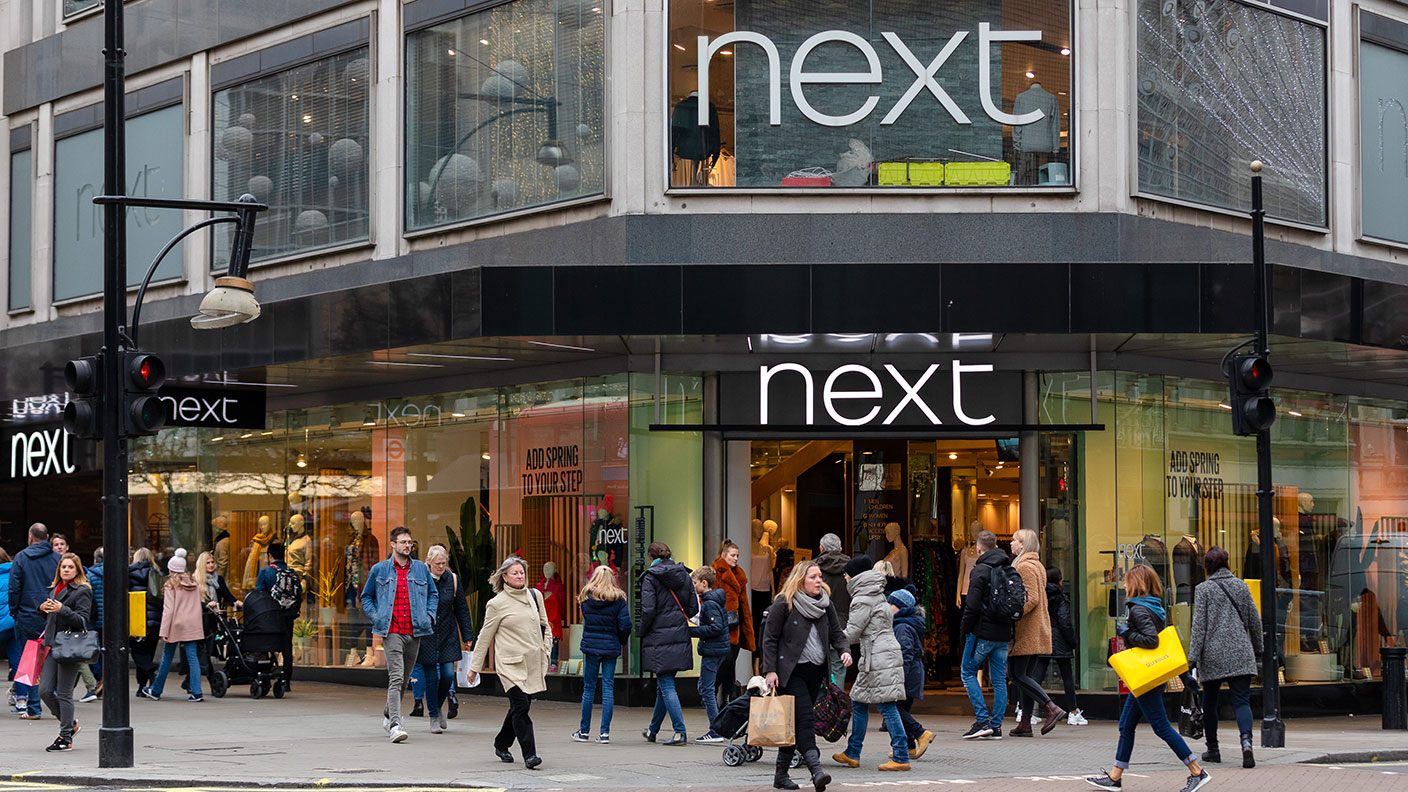Next shares soar as sales smash expectations – is the stock a buy?
High street and online retailer Next has reported a big rise in sales and profits. John Stepek looks at its performance and asks if it's worth buying Next shares.


Get the latest financial news, insights and expert analysis from our award-winning MoneyWeek team, to help you understand what really matters when it comes to your finances.
You are now subscribed
Your newsletter sign-up was successful
Want to add more newsletters?

Twice daily
MoneyWeek
Get the latest financial news, insights and expert analysis from our award-winning MoneyWeek team, to help you understand what really matters when it comes to your finances.

Four times a week
Look After My Bills
Sign up to our free money-saving newsletter, filled with the latest news and expert advice to help you find the best tips and deals for managing your bills. Start saving today!
Shares in retail chain Next (LSE: NXT) shot up by as much as 10% this morning on news that it is set to beat market forecasts for profits this year.
In a trading update which was pulled forward by a fortnight, Next noted that sales over the last 11 weeks “have been materially ahead of our expectations.”
Full-price sales for the period were up by 18.6% compared to the same period two years ago – ie, back before the coronavirus pandemic shut the economy down and life was basically normal. Next had been assuming that growth would be more like 3%.
MoneyWeek
Subscribe to MoneyWeek today and get your first six magazine issues absolutely FREE

Sign up to Money Morning
Don't miss the latest investment and personal finances news, market analysis, plus money-saving tips with our free twice-daily newsletter
Don't miss the latest investment and personal finances news, market analysis, plus money-saving tips with our free twice-daily newsletter
The gain was driven by a surge in online sales, which for the six months to 17 July were up by 56% compared to the same half in 2019.
By contrast, physical retail sales were down by 43% – though this drops to just a 6% fall if you take the first quarter (when strict lockdown was still in place) out of the equation. Within that, sales of homeware and children’s clothing have done particularly well.
As a result, the company is not only going to be able to repay £29m of business rate relief back to the government, it also raised full-year profit guidance by £30m to £750m.
There will also be a special dividend, because the company expects to be carrying £240m in surplus cash. The first instalment of this will be paid on 3 September at 110p a share, totalling £140m to shareholders. The rest is planned to be paid at the end of January 2022.
It’s little wonder that shareholders are chuffed with that.
What’s driven the gains? Next has some suggestions. These include general pent-up demand; the higher savings levels among customers; a fall in overseas holidays boosting domestic spending this summer; and the burst of nice weather we got towards the end of May – apparently “growth significantly slowed once the warm weather passed”.
Another thing worth noting for those of us wondering how the pandemic has affected household finances is that Next’s interest income from its credit sales fell quite significantly (though in line with expectations). Why? Partly because customers chose to pay down their balances faster, presumably using some of those excess savings to do so.
Should you buy Next shares?
Anyway, from an investor’s point of view, what does this all mean?
Next is probably one of the best examples of a reliable, high-quality company in the FTSE 100. It’s not remotely “sexy”. It sells middle-of-the-road clothing and middle-of-the-road furnishings. It’s not fast fashion or haute couture. It’s sensible and reliable.
But the thing is, while it’s not an Asos or a tech stock, it is extremely well run. I often make this comparison, but on the surface, Next looks a lot like Marks & Spencer, if you split out M&S’s food business (which many people argue should happen, but that’s a different story).
The clothing is similar – nice and reliable but not special. They both sell homeware. And yet one business is far more successful than the other.
M&S was late to the internet party. Next, by contrast, has long since parlayed its catalogue and credit business into a thriving online business. Even before the pandemic broke out, more than half of Next’s sales came via its online channel.
So the company has always been more resilient to threats from Amazon and other online retailers, never mind the advantage this online capacity gave it during the early days of near-total lockdown.
Did it take a lot of foresight to realise that online retail would be a big deal? Frankly, by this point, not really. You would think that the fact that Next’s rivals have struggled so badly to move online says more about them than about any particular stunning insight at Next.
And yet, Next is unusual. It communicates well with shareholders; it regularly beats expectations because it understands how to manage market expectations; and it manages to keep looking ahead without taking any stupid risks.
As long as that continues to be the case, I suspect that shareholders can continue to expect positive surprises in the longer run.
As for today’s price – I own shares in Next and we have tipped it in MoneyWeek magazine before. It’s not as cheap as it was in the depths of the pandemic, but not many things are. And, to be fair, it’s trading on a lower price/earnings ratio than its European peers, notes Aimee Donnellan, and is still below the 52-week high it hit just a month ago.
So I certainly have no qualms about continuing to hold it, and nor would I have any qualms about buying more.
Get the latest financial news, insights and expert analysis from our award-winning MoneyWeek team, to help you understand what really matters when it comes to your finances.

-
 Should you buy an active ETF?
Should you buy an active ETF?ETFs are often mischaracterised as passive products, but they can be a convenient way to add active management to your portfolio
-
 Power up your pension before 5 April – easy ways to save before the tax year end
Power up your pension before 5 April – easy ways to save before the tax year endWith the end of the tax year looming, pension savers currently have a window to review and maximise what’s going into their retirement funds – we look at how
-
 Defeat into victory: the key to Next CEO Simon Wolfson's success
Defeat into victory: the key to Next CEO Simon Wolfson's successOpinion Next CEO Simon Wolfson claims he owes his success to a book on military strategy in World War II. What lessons does it hold, and how did he apply them to Next?
-
 What's behind the big shift in Japanese government bonds?
What's behind the big shift in Japanese government bonds?Rising long-term Japanese government bond yields point to growing nervousness about the future – and not just inflation
-
 Halifax: House price slump continues as prices slide for the sixth consecutive month
Halifax: House price slump continues as prices slide for the sixth consecutive monthUK house prices fell again in September as buyers returned, but the slowdown was not as fast as anticipated, latest Halifax data shows. Where are house prices falling the most?
-
 Rents hit a record high - but is the opportunity for buy-to-let investors still strong?
Rents hit a record high - but is the opportunity for buy-to-let investors still strong?UK rent prices have hit a record high with the average hitting over £1,200 a month says Rightmove. Are there still opportunities in buy-to-let?
-
 Pension savers turn to gold investments
Pension savers turn to gold investmentsInvestors are racing to buy gold to protect their pensions from a stock market correction and high inflation, experts say
-
 Where to find the best returns from student accommodation
Where to find the best returns from student accommodationStudent accommodation can be a lucrative investment if you know where to look.
-
 The world’s best bargain stocks
The world’s best bargain stocksSearching for bargain stocks with Alec Cutler of the Orbis Global Balanced Fund, who tells Andrew Van Sickle which sectors are being overlooked.
-
 Revealed: the cheapest cities to own a home in Britain
Revealed: the cheapest cities to own a home in BritainNew research reveals the cheapest cities to own a home, taking account of mortgage payments, utility bills and council tax